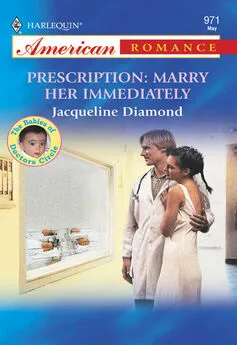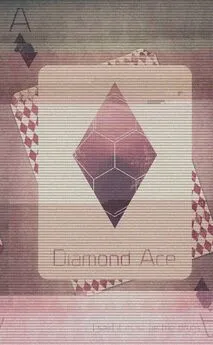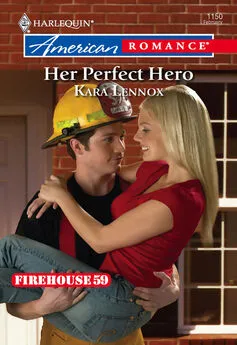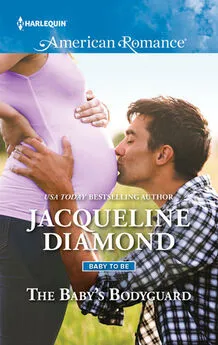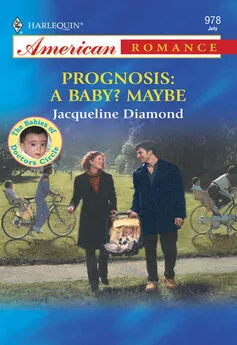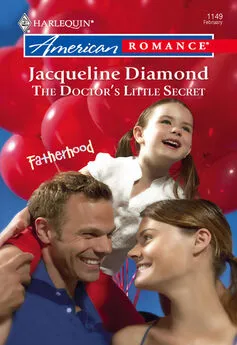Jacqueline Diamond - Prescription: Marry Her Immediately
- Название:Prescription: Marry Her Immediately
- Автор:
- Жанр:
- Издательство:неизвестно
- Год:неизвестен
- ISBN:нет данных
- Рейтинг:
- Избранное:Добавить в избранное
-
Отзывы:
-
Ваша оценка:
Jacqueline Diamond - Prescription: Marry Her Immediately краткое содержание
Prescription: Marry Her Immediately - читать онлайн бесплатно ознакомительный отрывок
Интервал:
Закладка:
He yanked on the center drawer first and took out a folded nightgown. The silky fabric flowed across his hands like warm water. Draped on Amy’s body, it must reveal every curve and inlet, he thought, and hurriedly stuffed it into the suitcase.
Quent braved the top drawer. Panties and bras were stuffed together, entangled with pantyhose. The jumble reminded him of his own sock drawer.
Try as he might, he couldn’t suppress an image of Amy wearing this stuff and peeling it off in front of him. With her experience, she’d probably perfected the art of the striptease.
“Hey!” the subject of his yearnings called from the hallway. “They’re calling for us to come out. You ready?”
“I’ll be right there!” Quent grabbed a handful of underwear, shoved it into the suitcase and clicked it shut.
They scurried out together. Amy lugged a satchel full of papers plus her laptop and the umbrella. “I’m glad they let me in there. I kept thinking of other things I need. Did you get everything?”
“You bet,” Quent said. “If I ever need a job as a ladies’ maid, you can give me a reference.”
“You did take some shoes, didn’t you?” she asked.
“Shoes?”
“You know, the things to go on my feet?” Amy groaned as they emerged into the blustery day. “Oh, well, I suppose it’s my fault for forgetting to mention it.”
The firemen refused to let them back in. “The building inspector called and said to keep the premises vacated until he makes sure it’s safe,” the battalion chief told them. “He won’t be able to get here before Monday.”
“I’ll survive,” Amy said. “At least I’ve got my credit cards.”
“I’ll pay you back for the shoes,” Quent said.
“You will not. I can always use a new pair.”
She left the place open, after the chief promised to lock up personally when his crew was finished and give the key to her neighbor. Even under the eaves, the air hung heavy with moisture, and Quent knew they both needed to get dry.
In the parking lot, he got a bright idea. Well, maybe not totally bright, if he’d given himself time to think about it, but right now Quent’s brain couldn’t stretch beyond the need to get Amy alone and resume the activity that had been so rudely interrupted.
“You can stay with me,” he said.
She handed him the umbrella and, waving aside his attempt to help, began stowing things in the trunk of her sporty sedan, which she’d moved out of her carport because it, too, was damaged. “You’re inviting me to move in with you till my roof gets fixed?”
“Why not?” That was one of Quent’s mottos.
“Because…” Amy pushed back a strand of black hair that had draped itself across her cheek. Quent fought down the urge to reach out and stroke that tantalizing wisp. “We’re friends. If I move in with you, stuff will happen, and then we’ll both get self-conscious about it and we might not be friends anymore.”
“Sure we will.” He had a sneaking suspicion she was right, but it didn’t pay to think too far in advance, because you never knew what the future would bring. “Life’s too short to deny yourself.”
“You really believe that?”
Quent shifted the umbrella, trying to keep them both dry. Rain tickled the back of his neck. “Sure I do.”
“Don’t you ever worry about consequences?”
“Not if I can help it.” At least, that had been his attitude until last year, when his niece and nephew were orphaned. Even since then, however, he preferred not to dwell on things he couldn’t control.
Amy shook her head. “Whatever works for you. Anyway, thanks for the offer, but my aunt lives a couple of miles away. I’m hoping she’ll take me in.”
A mixture of disappointment and relief welled up in Quent. Sure, he wanted to take Amy home and ravish her. He’d been fantasizing about it for weeks.
But underneath her gung-ho exterior, he knew Amy was complicated. Around her, he sometimes caught himself thinking about things he was in no way ready for, like a long-term relationship.
“You’re sure?” he said.
“Positive.” She reached out and ruffled his hair. “See you at work on Monday.”
“You bet.”
He handed her the umbrella and waited until she pulled out of the parking lot before taking refuge in his SUV. Quent debated whether to stay and keep an eye on her unit until the condo association got workmen out here. Considering that it was nearly dusk on a Saturday, however, he might have a very long wait. If Amy wasn’t worried about security, she probably knew best, he decided, and pulled away.
He negotiated the side streets to Pacific Coast Highway and swung north onto Serene Boulevard, which ran uphill toward the inland mesa area where he lived. Partially blocked by fallen palm fronds and other wind-blown debris, traffic inched up a steep incline toward the bluffs that separated the beach area from the mesa.
Quent was passing Serene Park, a green expanse with a great view of the ocean, when one of his contact lenses began to smart. It was a sharp, intense itch, as if a grain of sand had worked its way under there. Concerned about driving with such a distraction, he pulled into the deserted park and stopped.
There was no sense trying to fix things under these circumstances, so Quent popped out both lenses. He replaced them with a pair of glasses from the glove compartment.
Water gusted across the windshield and drummed on the roof. The SUV swayed in a burst of wind. Even the tail of a hurricane could pack a lot of force, he mused, and decided to wait awhile before resuming his journey along the clogged street. Maybe this downpour would let up.
Only now, sitting quietly with rain pounding outside, did Quent become aware of the tautness in his body. It wasn’t the pleasurable sexual tension he’d felt earlier with Amy, but an intermittent uneasiness that had dogged him for the past year.
He realized he was having a delayed reaction to the crash of the tree breaking through the roof. It had brought back with vivid clarity the moment when he’d awakened in darkness to the jarring ring of the phone. He’d still been living in San Diego, where he’d grown up, and had been finishing his neonatology residency.
For a disoriented moment, he’d figured one of his roommates would grab the phone. When neither answered, he’d remembered they were both working the night shift, so he’d answered.
He could still hear his father’s voice, almost toneless with shock. “They’re dead,” he’d said. “I should have seen it coming. Why did Jeffrey let her drive?”
Quent’s first reaction had been confusion. “What do you mean, they’re dead? Who’s dead?”
“Everyone,” Bruce Ladd had growled. “All of them. Except the kids.”
Until that moment, the demands of studying and working combined with his own playful nature had kept Quent from paying much attention to his family’s problems. He’d assumed the people he loved would always be around, always be fine, always be able to manage.
He knew that his mother, Alice, drank too much, and that his father responded by withdrawing emotionally. He’d never understood why his older brother Jeffrey refused to acknowledge the seriousness of Alice’s drinking, but then, Quent had tried to persuade her to seek help and knew how futile that was.
That night changed everything, too late. He hadn’t known, at a gut emotional level, that the people you loved could suddenly be snatched away from you. And he’d never imagined the abyss that would open up inside.
At the hospital, he learned that Jeffrey, Jeffrey’s wife Paula, their infant daughter and young son had gone with Alice to a friend’s barbecue in the countryside. Quent’s father, Bruce, had declined, because he had brought home overflow work from his law practice.
At the barbecue, liquor flowed. Afterwards, even though Jeffrey must have known Alice had been drinking, he’d allowed her to take the wheel of her car. It was, sadly, typical “enabling” behavior.
Driving too fast at night, she’d swerved to avoid hitting the back of a slow-moving semi truck. The car had veered off a small bridge and into a swollen creek.
All three adults were killed. The truck driver and a passerby had managed to unstrap the children and bring them to safety, but they’d been unable to save the others.
In the months that followed, Quent had steered his father into treatment for depression while struggling with his own sense of helplessness and regret. He’d also done his best to help the children get settled.
At the time, Quent had been working rotating shifts that made parenting an infant and a preschooler impossible. Since his father was in no condition to raise them and Paula’s mother suffered from severe arthritis, Paula’s sister Lucy had become their guardian.
Single and a bit flaky, she was a good sport, but he wondered now if she’d realized what she was taking on. Although Quent had visited frequently while he lived in San Diego, he had to be on call most weekends since moving to Orange County and it was hard to find time to make the three-hour round-trip drive.
As another blast of rain hit the glass, he recalled with a guilty twinge that he hadn’t talked to his niece and nephew in several weeks. The last time had been when Lucy called to thank him for some gifts he’d sent Tara and Greg.
He took out his cell phone and dialed.
“Hello? Enlighten me.” It was Lucy, who, even at twenty-six, sometimes talked like a teenager. During the week, she was an assistant department manager at a large insurance company that provided child care. On the weekends, her passion was long-distance running.
“It’s Quent. How’s the weather down there?”
“Miserable, which is why I’m working out indoors.” In the background, he heard the squeak of her treadmill. “Man, I hate this humidity. If I wanted humidity, I’d move to Florida.”
“How’re the kids?”
“Going crazy from being cooped up. Hang on.” A moment later, she put Greg on the phone.
Sounding grown-up for a four-year-old, he filled Quent in on his day-care group’s adventures in making something called stone soup. Apparently it included numerous ingredients, although no actual stones.
“We heard this story about it. The man said he could make soup from a stone,” Greg explained. “He talked this old lady into giving him stuff to make it taste better. You know, like noodles and onions.”
“Very clever,” Quent said.
Next, Tara babbled away happily, interposing a few recognizable words with her baby talk. Child development fascinated Quent. He’d studied the physical and emotional facts of childhood, but it was much more striking to observe them outside a clinical setting, especially when you cared so much about the youngsters.
He wondered if Amy liked kids. As a counselor who spent her life helping people, surely she did, and she’d shown a marked interest in the newborns yesterday. Maybe someday she’d enjoy meeting Tara and Greg.
“I’ll come see you soon,” Quent promised before saying goodbye to each child in turn.
“They miss you,” Lucy said. She didn’t include herself. The two of them had been practically strangers until the tragedy and, although they got along fine, had little in common apart from the children.
“How’re you doing?” he asked.
“Okay. I’m not much of a mother type but we muddle along. Thank goodness they like macaroni and cheese,” she said.
“I’d like to come visit soon. When would be convenient?”
“I’m not sure. We’ve got a lot of changes at work and I’ve had to put in some extra hours,” Lucy said. “I’ll give you a call, okay?”
Читать дальшеИнтервал:
Закладка:
